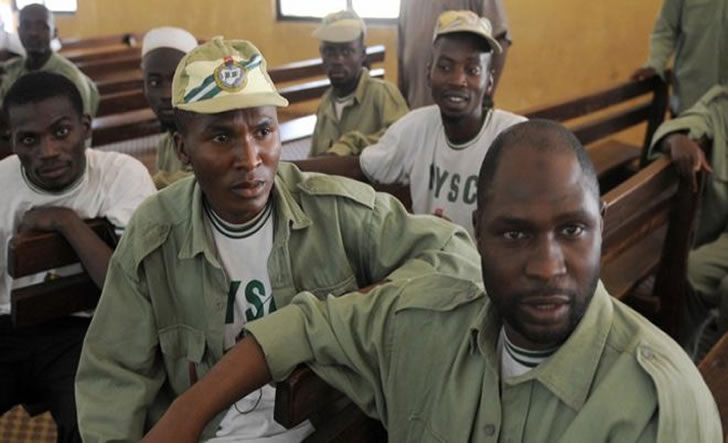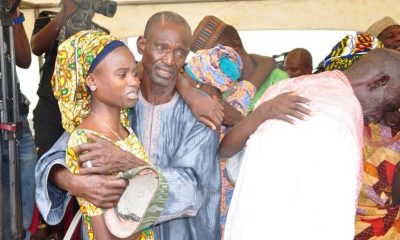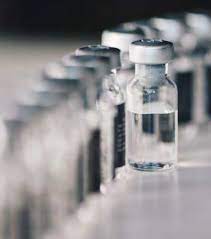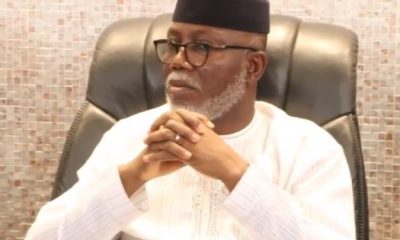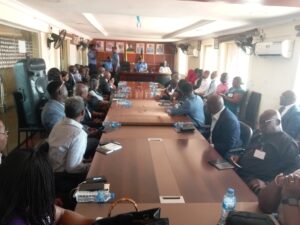NEWS
Over 200m girls, Women Experience FGM – UNFPA

Ms Ulla Mueller, Country Representative, UN Population Fund (UNFPA) on Saturday said over 200 million girls and women had experienced Female Genital Mutilation (FGM) globally.
Mueller said this in commemoration of World’s Zero Tolerance Day for FGM in a statement in Abuja by Mrs Kori Habib, Media Associate to UNFPA.
She expressed concerns over its likely increase in the future if there was no collaboration among stakeholders to act in stemming the trend.
“More than 200 million girls and women have experienced female genital mutilation and at least four million girls are at risk of undergoing the practice each year.
“Sadly, Nigeria alone contributes 10 per cent of this global burden.
The UNFPA Country Representative, who blamed a set back in the progress made in the fight against FGM on COVID-19, said two million additional cases of female genital mutilation were likely to occur over the next decade due to the pandemic.
“COVID-19 is threatening to reverse the progress made toward achieving Sustainable Development Goal 5, gender equality and specifically target 5.3, the elimination of FGM.
“In spite of the progress noted in Nigeria Demographic and Health Survey (NDHS) with Nigeria’s growing population, progress will need to be at least 10 times faster to meet the global target of elimination by 2030.”
Mueller, who reiterated the imperatives of ending female genital mutilation, said it was realisable through empowerment of women and girls.
According to her, education is paramount in empowering the woman and girl to oppose the continuation of the practice.
She described all acts of FGM as violation of human rights which must be ended with direct involvement of traditional rulers, government and relevant stakeholders.
The UN official, who expressed the commitment of UNFPA in eliminating female genital mutilation, called on Nigerian government to make financial commitment through annual budgetary allocation.
“Globally, progress will require some 2.4 billion dollars over the next decade which breaks down to less than 100 dollars per girl.
“Nigeria must join the global commitment efforts and ensure budget lines for female genital mutilation and other forms of Gender Based Violence (GBV) in the annual budget,” he said.
Mueller, however, appealed for global support to strengthen the transformative change through gender transformative approaches that tackle the structure, policies and harmful gender norms that perpetuate the practice.
NAN reports that Feb. 6 of every year is set aside by the UN to commemorate World’s Zero Tolerance Day for Female Genital Mutilation (FGM). (NAN)
NEWS
Ondo Disburses N2bn to 19,023 Unemployed Youths, Vulnerable Persons
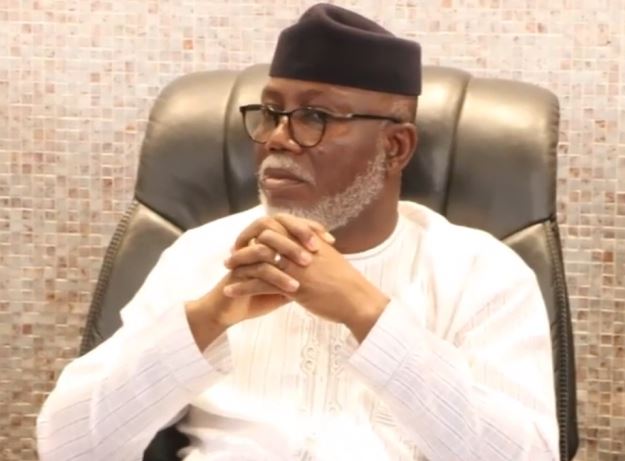
Gov. Lucky Aiyedatiwa of Ondo State says his administration has so far disbursed N2 billion grant to 19,023 beneficiaries, mostly unemployed youths and vulnerable persons in the state.
Aiyedatiwa said that the money was disbursed under the government’s Labour-Intensive Public Works (LIPW) programme.
He said this on Wednesday in Akure during the launch of the orientation and disbursement under the OD-CARES social transfer and LIPW.
He said the essence was to reduce poverty and enhance local economy with further instruction for the enrolment of additional 1,000 beneficiaries to empower more unemployed youths in the state.
According to Aiyedatiwa, the Federal Government has also paid N2 billion to 77,000 persons under the Renewed Hope Agenda.
“The Ondo State Conditional Cash Transfer Unit has assisted over 7,500 persons across the state through the OD-CARES programme.
“Over N2 billion has been disbursed to support the aged and chronically-ill adults with a total of 2,870 beneficiaries receiving bi-monthly stipends of N20,000 each.
“Furthermore, preparations for the enrolment of additional 5,000 new beneficiaries are in top gear.
“Our resolve to transform lives is a continuous exercise.
“We assure you that our administration would work tirelessly to ensure that our most vulnerable citizens receive the support they deserve,” he said.
The governor also said that his administration was committed to the welfare of the poor and vulnerable and every individual that deserved a safety net.
Earlier in an address of welcome, the Senior Special Assistant to the Governor on Social Investment Programme, Mr Felix Alonge, commended the administration for prioritising the needs of young people and vulnerable groups.
“This initiative reflects the government’s commitment to reducing unemployment and fostering social inclusion.
“It is a testament to the governor’s vision of a fair and prosperous state, where every citizen can access the support they need to improve their lives,” Alonge said.
One of the beneficiaries, Mrs Enuiyin Oluwafunmilayo, said she was thankful to the State Government for providing her a lifeline.
“These funds will help me meet my essential needs and ease the financial burden I have been facing,” Oluwafunmilayo said. (NAN)
NEWS
Senate Passes Bill to Establish National Eye Centre, Doma, Nasarawa

The Senate has passed a bill for the establishment of National Eye Centre Doma in Nasarawa state.
This followed the adoption of report of Committee on Health, on the National Eye Centre Doma, Nasarawa State establishment bill 2024 at plenary on Wednesday.
Presenting the report, Chairman of the Committee, Sen.
Banigo Harry (PDP-Rivers), said the bill sought to establish the national eye centre to cater for eye challenges of host communities, other citizens in the area and the neighboring communities.She said the committee in consideration of the bill, adopted due methodology, conducted a public hearing, captured the views and opinions of stakeholders and the general public.
“The bill received an overwhelming support from the stakeholders, as the committee had a clause by clause consideration of the items.
“It is on record that cataract is one of the common causes of severe visual impairment and glaucoma, hence the call for establishment of National Eye Centre for easy access for members of the community.
“The National Eye Centre when fully established in Doma will help to prevent, diagnose and treat eye conditions and coordinate research on eye disease.
“The Centre will also help train specialists, eye care handlers and professionals in eye diseases and related fields,’’ she explained.
She urged the senate to approve recommendations of the committee on the bill.
Sen. Dicket Plang (APC-Plateau), said establishment of more eye centres in Nigeria would provide services to citizens.
He said the Centre would provide access to eye service resulting in improved sight for citizens.
Sen. Victor Umeh (LP-Anambra), said establishment of the Centre would help take care of the eye needs of the people and reduce the influx of eye care seekers to Kano Eye Centre.
He said more eye care institutions should be established across the country, saying that more citizens should have access to eye care to reduce visual impairment. (NAN)
NEWS
Inflation Threatens Access to Diabetes Care for Low-income Nigerians – Stakeholders

Stakeholders in Nigeria’s health sector have raised concerns about the growing impact of inflation on the ability of millions of Nigerians to afford life-saving diabetes care.
The stakeholders said that with inflation tightening its grip on the country’s economy, many people living with diabetes are struggling to afford their medications and essential healthcare services.
They spoke at the 2024 Gatefield Health Summit, themed “Beyond 65,” in Abuja on Wednesday,
At the summit, global health leaders and advocates gathered to discuss the escalating crisis of Non-Communicable Diseases (NCDs), particularly diabetes, in Nigeria and sub-Saharan Africa.
Report says that in the region, NCDs are responsible for 37 per cent of all deaths, accounting for more than one in three deaths.
Dr Garfa Alawode, Co-convener of the Universal Health Coverage (UHC2023) Forum, a United Nations high level meeting, presented a research titled “Impact of Inflation on Affordability and Adherence to Anti-diabetics”.
Alawode’s research highlighted how inflation had severely affected diabetes management, especially for those in the lowest income brackets.
According to the research, the cost of managing diabetes has increased significantly from 2023 to 2024, with the lowest-income earners being hit hardest.
He revealed that the average cost of managing diabetes for individuals in the lowest income quintile had risen by nearly 40 per cent.
While the research said that the average annual income for this group is around N500,000, he said that the cost of diabetes management now stood at N350,000.
“This leaves little room for other essential needs such as food, housing, and transportation.
“Data from the International Diabetes Federation (IDF) and the National Bureau of Statistics (NBS) further illustrates that inflation is disproportionately affecting the most vulnerable populations.
“Even middle-income families are feeling the pressure, often cutting back on other healthcare expenses to afford diabetes care,” he said.
For Mrs Adeola Johnson, a 48-year-old diabetic from Lagos, the rising cost of medication has become unbearable.
“I used to spend N15,000 a month on my medications in 2023. Now, it is nearly N25,000, and I just can not keep up. Some days, I have to skip doses,” Johnson said.
On primary healthcare challenges and solutions, Dr Biobele Davidson of the BudgIt Foundation, and Executive Director of the Policy and Legal Advocacy Centre (PLAC) addressed the broader challenges in Nigeria’s PHC system.
Davidson highlighted the need for better-resourced PHCs that could reduce overcrowding in secondary and tertiary hospitals.
She pointed out that many PHCs were underfunded and understaffed, limiting their effectiveness, particularly in managing chronic conditions like diabetes and hypertension.
She also advocated for using digital platforms to capture patient feedback and improve service delivery, especially in medication access.
She said that strengthening PHCs would relieve pressure on higher-level hospitals and enhance overall health outcomes.
Supply chain expert, Mrs Azuka Okeke, Regional Director of the Africa Resource Centre (ARC), discussed the negative impact of Nigeria’s chaotic supply chains on healthcare delivery.
Okeke highlighted that while policies and frameworks existed their implementation often fell short, particularly in ensuring access to essential medicines at local healthcare facilities.
She recalled her engagement with pharmaceutical companies in 2018, urging them to produce essential medicines, like malaria treatments, that communities relying on PHCs desperately need.
She said that neglecting public health needs would eventually have consequences for all, including the pharmaceutical companies themselves.
The two-day summit concluded with a documentary that captured the daily struggles of Nigerians living with diabetes.
The documentary showcased how some Nigerians spend up to 25 per cent of their income on medication, underscoring the human toll of the disease.
Diabetes management is not only a daily battle for many but also a matter of life and death for others, who lose loved ones to preventable complications.
Former President Olusegun Obasanjo also shared his personal journey with diabetes, stressing the importance of diet and exercise in managing the condition as one ages.
His message resonated with the summit’s goal of raising awareness about diabetes and its management.
The documentary served as a poignant reminder of the significant impact diabetes had on the lives of many Nigerians.(NAN

